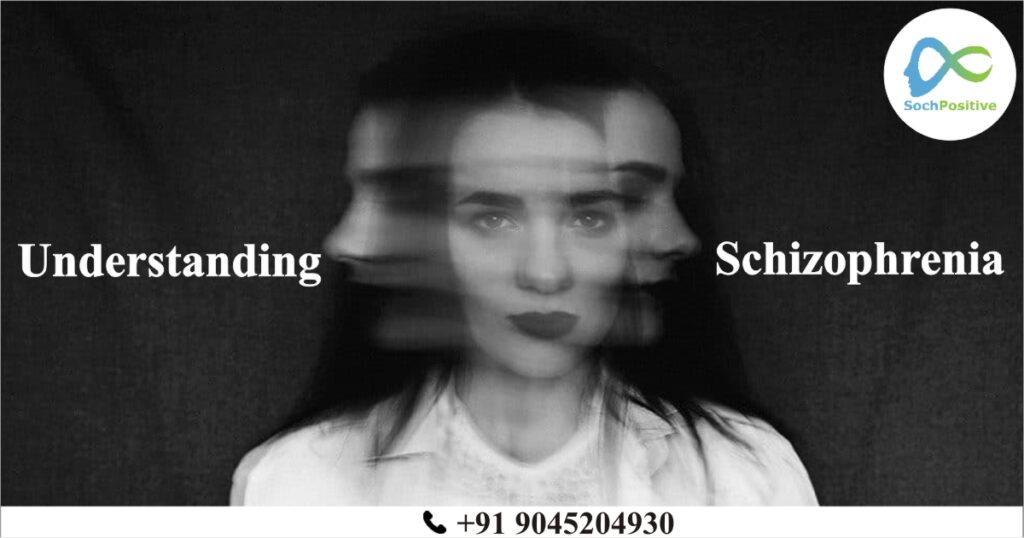Schizophrenia is a chronic and severe mental disorder affecting 20 million people worldwide (World Health Organization, 2019). It is a serious mental illness that affects how a person thinks, feels, and behaves. It may result in some combination of hallucinations, delusions, and extremely disordered thinking and behaviour that impairs daily functioning, and can be disabling. The considerable disability associated with it may affect personal, social, educational and occupational performance of an individual. Since, people with schizophrenia may seem like they have lost touch with reality, it causes a significant distress for the individual, their family members, and friends.
Schizophrenia is typically diagnosed in the late teen years to the early thirties and tends to emerge earlier in males (in late adolescence or early twenties) than females (in early twenties to early thirties). Schizophrenia can occur in younger children, but it is rare for it to occur before late adolescence.
Symptoms of Schizophrenia
Schizophrenia involves a range of problems with thinking, behaviour and emotions. Signs and symptoms may vary, but usually involve delusions, hallucinations or disorganized speech, and reflect an impaired ability to function. They may include:
- Delusions. Delusions are false beliefs that are not based on reality. For example, thinking that they are being harmed or harassed; people are planning and plotting against them; certain gestures or comments are directed at them; they have an exceptional ability or fame; or a famous person is in love with them. They occur in most people with schizophrenia in some form or the other.
- Hallucinations. Hallucinations usually involve seeing or hearing things that do not exist. For a person with schizophrenia, they have the full force and impact of a normal experience. Hallucinations can be in any of the senses, but hearing voices is the most common hallucination in schizophrenia.
- Disorganized thinking. Disorganized thinking can be inferred from disorganized speech. Effective communication can be impaired, and answers to questions may be partially or completely unrelated. Speech may also include putting together meaningless words that cannot be understood by others, which is also known as word salad.
- Extremely disorganized or abnormal motor behaviour. This may show in a number of ways, from childlike silliness to unpredictable agitation. Behaviour can include resistance to instructions, forming inappropriate or bizarre postures, a complete lack of response, or useless and excessive movement.
- Negative symptoms. Negative symptoms include loss of motivation, disinterest or lack of enjoyment in daily activities, social withdrawal, difficulty showing emotions, and difficulty functioning normally. For example, the person may neglect personal hygiene or appear to lack emotions (not making eye contact, blank facial expressions or speaking in a monotone). Also, the person may lose interest in everyday activities, socially withdraw or lack the ability to experience pleasure.
- Cognitive symptoms. The cognitive symptoms include problems in attention, concentration, and memory. For some individuals, the cognitive symptoms of schizophrenia are subtle, but for others, they are more prominent and interfere with activities like following conversations, learning new things, or remembering important information. Specifically, individuals typically experience:
- Difficulty processing information to make decisions
- Problems using information immediately after learning it
- Trouble focusing or paying attention
The symptoms of schizophrenia must persist for at least six months for a diagnosis to be made. Symptoms can vary in type and severity over time, with periods of worsening or improvement of symptoms and some symptoms may always be present.
Causes
It is not known what exactly causes schizophrenia, but researchers believe that a combination of genetics, brain chemistry and environment contributes to development of the disorder. Problems with certain naturally occurring brain chemicals, including neurotransmitters called dopamine and glutamate, may contribute to schizophrenia. Neuroimaging studies have shown differences in the brain structure and central nervous system of people with schizophrenia.
Schizophrenia also sometimes runs in families. However, it is important to know that just because someone in a family has schizophrenia, it does not mean that other members of the family will have it as well. Scientists have also established that interactions between genetic risk and aspects of an individual’s environment may play a role in the development of schizophrenia. Environmental factors that may be involved include living in poverty, stressful surroundings, inappropriate parenting and family environment and exposure to viruses or nutritional problems before birth.
Risk factors
Although the precise cause of schizophrenia is not known, certain factors seem to increase the risk of developing or triggering schizophrenia, which include:
- Having a family history of schizophrenia
- Some pregnancy and birth complications, such as malnutrition or exposure to toxins or viruses that may impact brain development
- Taking psychotropic drugs during teen years and young adulthood
How can you help someone you know with schizophrenia?
Caring for and supporting a loved one with schizophrenia can be very challenging. It can be difficult to know how to respond to someone who is experiencing schizophrenia.
Here are some things you can do to help your loved one:
- Help them get treatment and encourage them to stay in treatment
- Remember that their beliefs or hallucinations seem very real to them
- Tell them that you acknowledge that everyone has the right to see things their way
- Be respectful, supportive, and kind towards them
Management
Schizophrenia is treatable. If left untreated, the symptoms of schizophrenia can be persistent and disabling. Effective treatments are available. When delivered in a timely, coordinated, and sustained manner, treatment can help affected individuals to engage in school or work, achieve independence, and enjoy personal relationships.
Treatment with medicines and psychosocial support is the most effective for schizophrenia. The engagement of family members and the wider community in providing support is very important. Facilitation of assisted living, supported housing and supported employment are effective and research based management strategies for people with schizophrenia.






